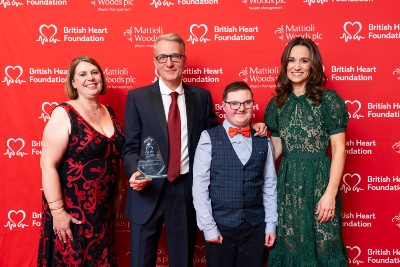News in December
- University of Bristol clinical scientist, historian, alumnus and members of staff recognised in King's New Year Honours 30 December 2023 Two academics at the University of Bristol, clinical scientist, Professor John Iredale, and historian, Professor Ronald Hutton, alumnus Gregory Doran, alumnus and member of staff Sandy Mitchell, and former member of staff, Dr Teame Mebrahtu have been recognised for their significant achievements in this year's King's New Year Honours list.
- Light physical activity shows great promise in reversing childhood obesity caused by being sedentary 18 December 2023 Increased sedentary time from childhood through young adulthood caused increased body fat and abdominal fat in a new follow-up study. However, the results also showed that light physical activity (LPA) may completely reverse the adverse process. Moderate-to-vigorous physical activity (MVPA) may only reduce the effect. The study, published in Nature Communications, was conducted in collaboration between the universities of Bristol and Exeter, University of Colorado and the University of Eastern Finland.
- University of Bristol awarded over £3m for the development of lithium technologies for fusion 14 December 2023 Three University of Bristol projects have secured prestigious contracts worth circa £3.5m with United Kingdom Atomic Energy Authority to develop lithium technology for fusion energy.
- 15% of child deaths linked to infections, new report finds 14 December 2023 Fifteen per cent of child deaths in England over the last three years are related to infection, according to a new report published today [14 December] by the University of Bristol’s National Child Mortality Database (NCMD) team. The report uses the NCMD’s unique data on all child deaths in England to examine 1,507 infection-related deaths between April 2019 and March 2022.
- International acclaim for tobacco-themed drama inspired by University of Bristol research 12 December 2023 A four-part audio-drama, Tobias and Syd, launched earlier this year and inspired by University of Bristol and Durham University research, is currently ranked second in the Audio Fiction World Cup and is the top UK podcast.
- Statement: In relation to inflammatory statement on X (formerly Twitter) by Harriet Bradley 8 December 2023 Statement: On 7 December 2023 the University was made aware of an inflammatory statement made on 5.12.23 on X (formerly Twitter) by Harriet Bradley, an Emeritus Professor.
- Research calls for urgent focus to reduce the impact of extreme heat on chronic diseases linked to urban environments 7 December 2023 Advanced tools and more experimental studies are needed to urgently understand the impact of extreme heat events on urban health and wellbeing in the UK.
- Bristol researcher wins BHF Research Story of the Year for work on children’s heart plaster 7 December 2023 A University of Bristol researcher who has developed a new type of 'heart plaster' that could improve the way surgeons treat children living with congenital heart disease has won this year's British Heart Foundation (BHF) Research Story of the Year. The award is part of the charity's annual Heart Hero Awards 2023.
- University of Bristol and Science Creates announce £8.5m investment to develop major new incubator on the Temple Quarter Enterprise Campus 6 December 2023 The University of Bristol and deep tech organisation Science Creates have agreed to launch a £8.5m major new incubator in the heart of the new Temple Quarter Enterprise Campus.
- Dose matters: HIV drug could prevent coronaviruses, study finds 5 December 2023 Coronaviruses are a global public health risk, with three highly infectious species, including SARS-CoV-2, emerging in the last 20 years. New research by the University of Bristol has shown how an HIV drug could stop many coronavirus diseases, including the SARS-CoV-2 variants, when given to infected cells at the right concentration. The findings could strengthen the arsenal of antiviral drugs available to combat current and future coronavirus outbreaks.
- Bristol ranked as world's 17th most sustainable university 5 December 2023 The University of Bristol has been named as one of the most sustainable universities in the world, according to a new global league table.
- Professor Mark Birkinshaw, 1954-2023 1 December 2023 Mark Birkinshaw, a distinguished Professor of Cosmology and Astrophysics in the School of Physics, died in July. His colleagues and friends Professor Belinda Wilkes and Emeritus Professor Steven Phillipps share their memories of Mark and recall his significant contributions to the field.
- Bristol co-development will give AI window into complex human activity 1 December 2023 More than 1,400 hours of footage capturing humans performing tasks simultaneously from their point of view and externally, will help give AI models an understanding of how humans carry out activities.
- More people getting into difficulties with credit 1 December 2023 New research has revealed high levels of consumer debt among the majority of UK households.










.jpg)


